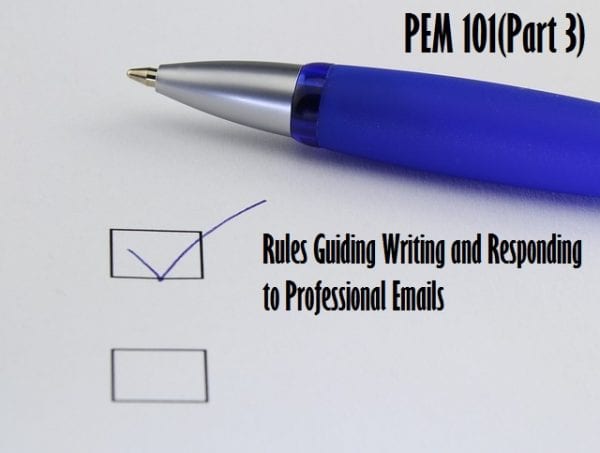Conflicts are bound to arise when individuals of diverse backgrounds and personalities interact. This is further complicated by office politics and pressures at work, so expect to receive some less than pleasant communication and rude emails from time to time, especially via email.
Your ability to manage relationships, remain professional, and respond appropriately to communications – no matter how offensive, will distinguish you as a competent professional. So, when you receive rude emails, you have the choice to respond professionally rather than instinctively.
Tight deadlines, pressures to secure deals, and invasive personalities can create tension in the workplace. Coworkers can often be the greatest source of stress in the workplace, directly or indirectly, but you are only responsible for your own actions and how you handle unpleasant interactions and communication from coworkers. Your handling of these tense interactions could be the deciding factor in whether you have a pleasant work environment, a toxic environment, stay in the organization, or struggle in the workplace.
Quick tips for responding to rude emails from coworkers
Here are some tips for responding to rude emails from coworkers:
Step away and take a deep breath
When you receive a rude email, your first instinct is to react. Resist the urge to do that, rather step away from your system, take a calming breath or focus on another task then return to the offending mail when you have calmed down. Now you are in a better state of mind to respond rather than react to the situation. Stepping away also give you the opportunity to gain new perspectives on the matter.
Make No Assumptions
Written communication loses the context provided by body language and tone, therefore, information that is not properly captured can be easily misconstrued. Differences in culture, background or language use may also alter the intent of written communication. Make no assumptions about the intent or motive of the sender, especially when ambiguous language or expressions are used. For example, cultures that value seniority or difference see may interpret communication that is too casual or uses slag terms as inappropriate or rude, while the sender from a liberal background will see nothing wrong with his communication.
Clarify the Situation
In not making assumptions about the intent of the sender, take the proactive step to ask for clarification from the sender. If the email you received read like Peter saying you are incompetent and the reason your team lost a deal? Ask Peter to clarify his statement or provide some further information to support his statements. A simple example of a response in this sort of situation would be:
Sample Email – Responding to Rude Email
Dear Peter,
Further to your earlier mail. Please be informed that all assigned tasks were executed within the stipulated timelines developed at the last team meeting.
The Milling company has confirmed that they will not be signing on to our program at this period but will review the proposal again at a later time. Based on my discussions with members of their team, I understand that their decision is due to budgetary limitations at this time.
Kindly clarify and elaborate on any additional issues aside from these that may have hindered the closing of this deal.
Regards,
Nancy
Check Yourself

Self-awareness is crucial for effective relationships with others. So be reflective and evaluate your actions and obligations to ensure that you have not done something to upset your coworker and attract the rude email. Leave your ego out of the matter and assess the situation objectively. Though rudeness is unacceptable, write off the situation as the other party’s failure to engage properly and focus on just your own actions. So on the team project with Peter, did you fail to meet some deadlines or obligations? If you have some fault own the situation and apologize; but if you are unjustly treated make your case professionally by focusing on the facts.
Take the communication offline
Impersonal means of communication can often create undue misunderstanding. Take the conciliatory and proactive option of walking over to your coworker (if the person is in the same location) and asking for clarification on the email. Of course you should be calm, collected and focused on positive/constructive outcomes before going this route to avoid an office confrontation. Another alternative to speaking to the sender is speaking to another colleague to get their input on the best way to respond. Sharing with a trusted coworker may provide a different perspective and tact in resolving the issue amicably.
Focus on work requirements
If you receive a rude email that does not require a response from you, all the experts agree that you are better served by not responding. If you deem it necessary to respond, focus on the email’s relevant work issues and not on the offensive statements. Remember to retain the professional tone in all business interactions.
The pressures and challenges of corporate organizations and businesses can often be overwhelming and stimulate fight-flight responses from individuals who may exhibit hostility, rudeness, or coldness. As Steven Covey teaches, start with the end in mind! If this is an organization where you like working and this is an individual you need to interact with often, your handling of rude communication will significantly affect how you feel about each other going forward and may affect your overall job satisfaction.
Though one-off incidences of rudeness can be completely written off as poor judgement, persistent abuses are more harmful to your overall occupational health.
An article from the Sydney Morning Herald provides some creative tactic for dealing with repetitive rudeness:
- Copy/Broadcast: The author suggests forwarding the email to other members of your team to react to the issue or copying other people in when responding. This discourages bad behavior as the sender will be aware that you will involve others in the matter.
- Escalate: If a coworker has established a pattern of rudeness or abusive language in emails (Save your emails to prove this pattern), you may wish to report the matter to your supervisor or the Human Resource department. Use your judgement to decide the best route. Some organizations have a policy of all matters being passed to direct supervisors before escalating to other parties so confirm your organizations policies.
Conclusion
Occupational health experts have confirmed that we are at our most productive when happy and satisfied with our work and working environment. Job satisfaction can be eroded by the stress of dealing with rudeness or negativity from colleagues/coworkers. Learn and apply relationship management skills and techniques for handling tense or unpleasant situations when they arise so that your productivity and job satisfaction are not compromised.







